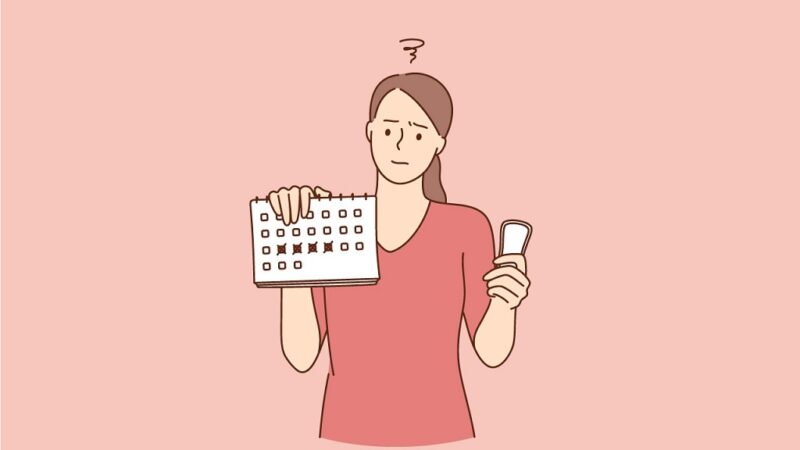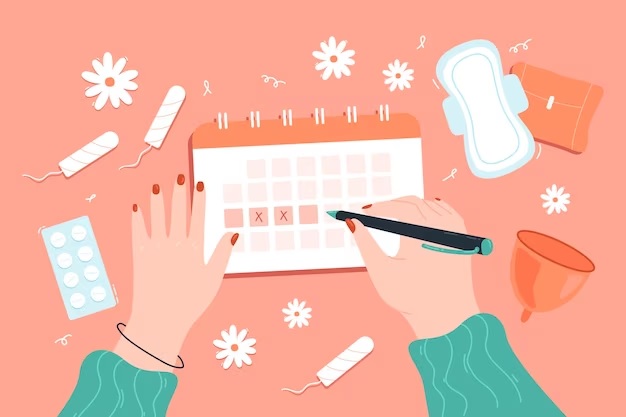
If you want to know what is the cause of early period and what causes it, follow this article until the end.
What is the cause of early periods? What causes the period to come forward?
A period is considered “early” if menstrual bleeding starts within 21 days of your last period. This is because the normal cycle length is between 21-35 days. So if you have a 32-day cycle one month and a 27-day cycle the next, don’t worry, this is completely normal! In this article, we are going to tell you what is the cause of early periods? What causes the period to come forward?
Also read: Liver-like blood clot in period
What is the cause of early periods?
There can be various reasons for a missed period. Some of the most common causes of missed periods are:
1. Advancement of period due to hormonal imbalance
An imbalance in hormones, such as estrogen and progesterone, can cause changes in the menstrual cycle that lead to premature periods.
2. Premenstrual stress
Emotional or physical stress can affect hormonal balance and cause irregularity in the menstrual cycle, including early periods. High cortisol levels also decrease progesterone levels. Since progesterone is one of the key reproductive hormones that regulate your menstrual cycle, this can lead to irregular cycles.
3. Weight changes
Significant weight loss or gain can affect hormone levels and lead to altered menstrual cycles, potentially causing premature periods.
4. Delayed periods due to drugs
Some medications, such as hormonal birth control, antidepressants, or blood thinners, can affect the menstrual cycle and cause early periods.
5. Before menopause
Women approaching menopause may experience hormonal changes that cause irregular periods, including premature menses.
6. Background medical conditions
Health issues such as polycystic ovary syndrome (PCOS), thyroid disorders, or uterine fibroids can contribute to menstrual irregularities, including premature periods.
7. Lifestyle factors
Excessive exercise, poor diet or sleep disorders can affect hormonal balance and lead to early periods.
8. Early period due to pregnancy complications
Early periods or irregular bleeding may occur due to complications in early pregnancy such as implantation bleeding or miscarriage.
Also read: Immediate termination of period at home


What causes the period to come forward?
Don’t worry, it’s more common than you think! In fact, up to 69% of women have cycles that vary by up to 6 days.
As we said, lifestyle factors such as diet, exercise and stress usually affect your menstrual cycle. Other times, an underlying disease such as PCOS or a thyroid disorder may cause premature periods.
Usually, if a premature period occurs once, there is nothing to worry about. But read on to learn more about what causes a missed period.
1. Prolapse of period caused by Incorrect calculation
Sometimes you may simply get your dates mixed up. This can easily happen if you have irregular cycles or if you haven’t been tracking your cycles regularly.
There are many period tracking apps that you can use to take the guesswork out of tracking your cycle. Such tracking apps can provide accurate predictions of your cycle based on your past data and patterns. This makes it less likely that your dates will get mixed up in the future.
2. Advancement of period due to implantation bleeding
Have you heard of implantation bleeding? It’s almost like a sneak peek of what’s to come!
You may notice a few blood stains on your clothes, but this is not a period. Rather, it is the result of the fertilized egg sticking to the uterine wall. It usually occurs around 6-12 DPO and occurs because blood vessels in the uterus may be damaged when the embryo implants into the uterine wall.
Implantation bleeding is significantly different from period bleeding. It is usually light and only lasts up to 2 days. It is usually pink or brown.
There may be other symptoms such as:
- Mild or weak cramps
- Mood swings
- Nausea or vomiting
- Increased breast tenderness or breast tenderness
- back pain
- headache
If you think you may be experiencing implantation bleeding, take a pregnancy test the day after your expected period to confirm your pregnancy.
3. Hormonal birth control causes periods to come forward
If you are using hormonal birth control, you may have light bleeding outside of your scheduled period. This spotting outside of your period is called “spotting” and may be mistaken for an early period.
You may have breakthrough bleeding if any of the following apply to you:
- You have started birth control in the last 3-6 months
- You have recently changed birth control
- You forget to take your birth control pills or you don’t take them regularly
- You used emergency birth control like Plan B
Also read: Why did I get my period but I don’t bleed?
4. Exercising too much causes menstruation to come forward
Too much exercise suppresses the hypothalamus. This is the area of the brain that produces hormones such as FSH and LH. Because exercise suppresses the hypothalamus, it decreases FSH and LH production.
Also, excessive exercise over time reduces the amount of fat in the body, which leads to a decrease in estrogen levels.
5. Maturity
Young girls usually experience their first period around the age of 12-13. During puberty, the process of regulating the menstrual cycle, known as the hypothalamic-pituitary-ovarian axis, is still immature.
The adaptation period can cause irregular, early or late periods. 60-80% of cycles become regular in about 3 years.
6. Endometriosis causes early periods
Endometriosis is a gynecological disease in which the inner tissue of the uterus (aka endometrial tissue) grows outside the uterus.
This can lead to symptoms such as:
- Irregular periods
- Heavy courses
- Bleeding between periods
- Severe abdominal pain
- Painful periods
Intermenstrual bleeding can easily be confused with a period. In addition, there is often more texture to shed each cycle. This may cause your period to come earlier and be accompanied by heavy bleeding.
7. Thyroid disease causes the period to come forward
Your thyroid gland plays an important role in regulating your metabolism and hormones. It directly affects the production, transport and elimination of estrogen and progesterone. Thyroid hormones also play a role in the growth of ovarian follicles. These follicles secrete hormones that affect the menstrual cycle.
When thyroid function is disrupted, it can throw off your menstrual cycle. This may cause you to have shorter or longer periods.
8. Circadian rhythm disturbance
Your circadian rhythm (your body’s “internal clock”) is closely related to your menstrual cycle. Disruption of your circadian rhythm can cause irregular periods. If you work night shifts or have recently moved to a different time zone. You have traveled, this may happen.
9. Some sexually transmitted diseases cause periods to come forward
STDs like chlamydia and gonorrhea are common and although they may not cause symptoms when they occur, they are known to cause spotting between periods or spotting.
Also read: Strong Menstrual Opener
last word
If you’re experiencing consistent early periods or any other concerns related to your menstrual cycle, it’s important to consult a healthcare provider for proper diagnosis and treatment.
RCO NEWS
RCO
















